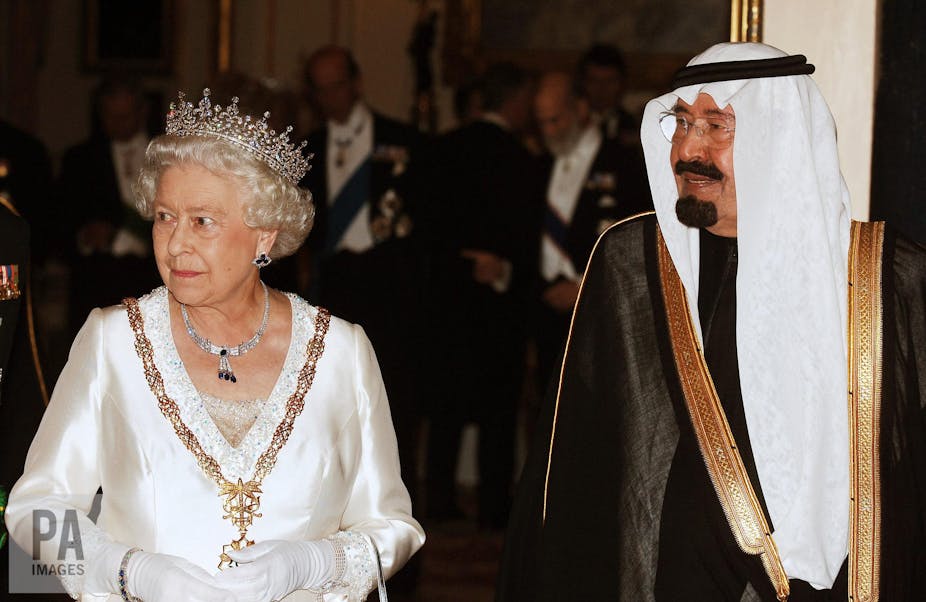Pity the Queen. When, at the coronation back in 1953, she swore to uphold the law and protect the Church of England, no one mentioned that she would also have to open her house at intervals to tyrants, dictators, murderers – and now, at some date yet to be fixed, Donald Trump.
State visits are a hangover from the time when rulers corresponded through ambassadors and rarely met each other in person. Edward VII’s unexpectedly successful 1903 visit to Paris has been credited with helping form the Anglo-French Entente Cordiale the following year. But in an age when world leaders regularly jet through the skies to chat with each other, state visits might seem rather old-fashioned.
Modern rulers, however, are as susceptible to a bit of pomp and ceremony as anyone else – and nobody does ceremony like the British.
At their best, state visits can cement relations between countries and help heal years of conflict. The Queen’s 2011 state visit to Ireland, in which she astonished her hosts by addressing them in Gaelic, was a triumph – the more so as, for security reasons, any visit by British royalty to Dublin had been impossible for years.
Equally historic was the then US president, Richard Nixon’s 1972 visit to China. The sight of the “leader of the free world” chatting away to the leader of the cultural revolution was remarkable enough to inspire the composer John Adams to write his opera Nixon in China, surely the first operatic treatment of a state visit since Handel’s Arrival of the Queen of Sheba.
Protests vs. pragmatism
But it’s the problematic state visits which capture the headlines. The Russian president, Boris Yeltsin, turned up drunk for a visit to Ireland and kept them waiting for him to emerge from his plane. More serious was Ronald Reagan’s embarrassment at being taken to a German war cemetery to pay tribute to war dead who included members of the Waffen SS.
The 1971 state visit to London of Emperor Hirohito of Japan prompted protests by ex-servicemen who were still angry at their wartime treatment at the hands of Hirohito’s men – some protesters turned their backs on the carriage procession and wore red gloves to symbolise the blood they thought he still had on his hands.
They may not have realised that they were echoing the similarly silent protests that greeted the Prince of Wales when he visited India in 1921, a mere two years after the infamous Amritsar Massacre: he too was thought to have blood on his hands.

Similar objections were made against state visits by such murderous leaders as Robert Mugabe and the Romanian dictator Nicolae Ceausescu and his wife. The Queen found the Ceausescus so repellent she is supposed to have deliberately avoided them in the grounds of Buckingham Palace, and she never forgave the then foreign secretary, Dr David Owen, for having forced her to receive them.
Grip, grin and bear it
The Ceausescu visit is a reminder that state visits are political affairs arranged by the Foreign Office. If a bit of glitter, a fanfare or two and a ride down the Mall accompanied by the Household Cavalry might swing a trade deal or incline a foreign head of state more favourably towards Britain and the West then, goes the wisdom, it is a small price to pay.

It is hard to see what was achieved by hosting Mugabe or Ceausescu, but, arguably, the controversial 2007 state visit by Saudi King Abdullah helped cement the West’s dependence on the Saudi regime. Whether this justifies turning a blind eye to the kingdom’s human rights abuses is another matter.
Sometimes bullets have to be bitten. Two Chinese state visits in ten years (in 2005 and 2015) are a recognition of geopolitical reality, despite the protests against China’s human rights record. There will no doubt be similar protests when Donald Trump finally comes to Britain. But he would be well advised to avoid visiting any London breweries while he is here. When the notoriously brutal Austrian general Julius Jacob von Haynau visited the Anchor brewery in 1850, he was recognised and beaten up by the workers to general national rejoicings and Queen Victoria had to apologise to the Austrian government. As I say, pity the Queen.

